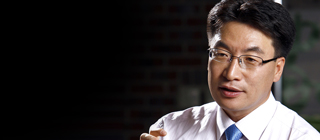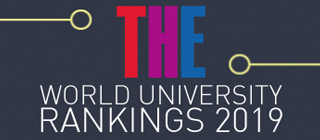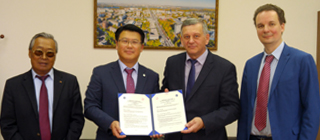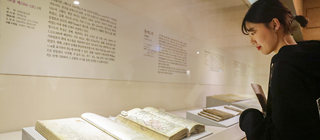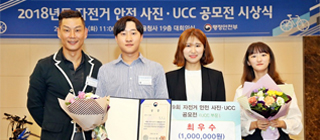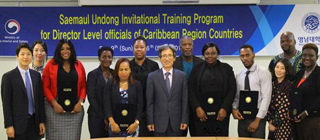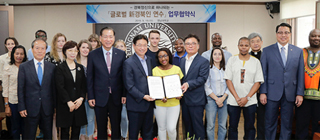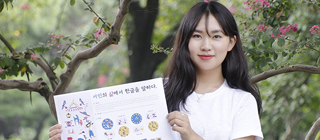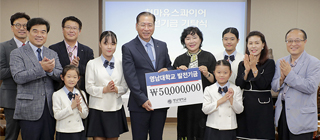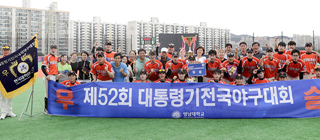-
-
Globally trusted world university ranking Evaluated 1,258 universities in 86 countries, including 29 universities in Korea such as YU High assessments in global university rankings including the Leiden Rankings... Acknowledged for ‘educational and research’ capacities [September 27, 2018] THE World University Ranking 2019 Rank in Korea World Rank College 1 63 Seoul National University 2 82 Sungkyunkwan University 3 102 KAIST 4 142 POSTECH 5 198 Korea University 6 201-250 Yonsei University UNIST 8 351-400 Kyunghee University Hanyang University 10 401-500 GIST 11 501-600 Chung-Ang University Sejong University University of Ulsan 14 601-800 Yeungnam University Ewha Womans University Konkuk University Pusan National University Sogang University 19 801-1000 Kyungpook National University Ajou University Chonnam National University Inha University Seoul National University of Science and Technology Chonbuk National University 25 1001+ Chungnam National University Hallym University Incheon National University Kookmin University Seoul National University of Science and Technology * Source : THE World University Ranking 2019 YU (President Sur Gil-soo) was ranked 14th (601-800 in the world) in the 2019 World University Rankings announced by the THE (Times Higher Education), a global university evaluation institute based in England. On the 26th, THE released its ‘2019 World University Rankings’. These rankings include 1,258 universities from 86 countries. Among Korean universities, a total of 29 were ranked including YU, Seoul National University (63rd in the world) and Sungkyunkwan University (82nd in the world). Together with YU, Ewha Womans University, Konkuk University, Pusan National University, and Sogang University tied for 14th in Korea, being placed in the top 601-800 in the world. THE, which was established in 1971, is an authoritative global university evaluation institute together with the British QS (Quacquarelli Symonds) and has been announcing world university rankings annually since 2004. It gives rankings using the five indices of educational conditions (30%), research achievements (30%), thesis citations (30%), internationalization (7.5%), and industry-academic cooperation income (2.5%). In particular, THE’s world university rankings apply rigid standards and is thus acknowledged worldwide for their credibility. Meanwhile, in the ‘2018 Leiden Ranking’ announced in May, YU was ranked 50th in the world (based on top 10% thesis citations) in the Mathematics & Computer Science sector in the ‘2018 Leiden Ranking’, thus being placed top in Korea and being recognized for its world-class research competence. YU was placed in the top 50 in the world for four years straight in the mathematics & computer science sector in the Leiden Ranking, which evaluates global university rankings based on the qualitative levels of theses. It was also placed in the top 10 in the overall ranking in the ‘2018 Leiden Ranking’, thus demonstrating its excellent research capacities. Regarding such achievements, YU President Sur Gil-soo said, “YU’s educational and research capacities are continuously being recognized by globally trusted college evaluation institutes.” He added, “We will spare no efforts to raise our education and research standards to world-class levels.”
-
Constructed global partnerships with prestigious universities of Russia Procured bridgehead for exchange with local Korean self-governing organization Opened local PR center for the YU Medical Center [October 12, 2018] <Photo taken after signing an MOU between YU and NSTU> (from left to right: NSTU Professor Evgeny, YU External Cooperation Office Director Heo Chang-deok, NSTU President Bataev, International Relations Vice Rector Nekrasov) YU obtained a base for international exchange at Novosibirsk, the center of the Trans-Siberian Railway that connects the east and west, and the third largest of Russia. YU (President Sur Gil-soo) recently signed MOUs with Novosibirsk State University (hereinafter NSU), a prestigious university in the basic science and engineering sector of Russia, and Novosibirsk State Technical University (hereinafter NSTU). NSU, which has become an international exchange partner of YU, is a comprehensive university founded in Academgorodok, a science research complex in Novosibirsk. It is one of the three most prestigious universities of Russia together with Moscow State University and Saint Petersburg State University. Fitting to the geographical name meaning ‘Science Academy City’, it is home to over 20 academic research institutes ranging from nuclear physics and geology to palaeography, as well as the supervising institute, the Russia Science Academy Siberia Center. Here, NSU is fostering next-generation human resources in science technology. NSTU is also a prestigious state university of Novosibirsk together with NSU, and it is assessed to be superior in the fields of electric and electronic engineering, physics, and aerospace engineering. From next year, YU and the two universities will exchange five students each every semester, conduct short-term cultural exchange programs, language exchange students, pursue international joint research and co-publication, conduct volunteer activities in international cooperation, and conduct other international exchange and cooperation programs in various fields. Furthermore, it is planning to review the implementation of the ‘2+2 dual diploma program’ to offer Russian students majoring in Korean studies to experience Korean society and culture at YU, while learning the Korean language. Currently, 50 students at NSU and 40 students at NSTU are majoring in Korean studies, and these numbers are on the rise. Furthermore, YU also agreed to develop a short-term education program for students in aerial navigation studies together with NSTU. In particular, YU also made a bridgehead for exchange with the Korean self-governing organization in the Novosibirsk region through this visit. YU met with Professor Evgeny B.Tsoy, chairman of the Korean self-governing organization at NSTU to discuss plans for exchange and cooperation with ethnic Koreans and the immigrant population in Russia. As part of this, YU is planning to take active measures to overcome the severed time over the years and restore national homogeneity by pursuing international cooperation programs to look back on the history of Korean diaspora together with NSTU and the local Korean self-governing organization. <YU held the opening ceremony of the YU Medical Center ‘Life Center’ in Novosibirsk on the 8th> (left to right: YU External Cooperation Office Director Heo Chang-deok, Daegu City Medical Tourism Promotion Agency Director Cha Soon-do, NSU International Exchange Center Director Dmitry, YU Medical Center Director Yoon Sung-soo, NSU Medical Research Center Director Pokrovskii) Meanwhile, during this visit, YU opened the ‘Life Center’ of the YU Medical Center to offer medical consultation for locals while extending YU’s advanced medical technologies and successfully constructing a base for expanding international exchange in Novosibirsk. YU External Cooperation Office Director Heo Chang-deok (52, Social Science) said, “There is a wrong impression of Siberia as a sleeping land and a land of frozen soil. But in fact, it is a land with infinite potential with abundant natural resources and a beautiful natural environment, which I also learned through this visit.” He added, “I hope that at Novosibirsk, which is the heart of Siberia, our students will gain more competitiveness in preparation for the day that economic cooperation with Russia grows.”
-
Special exhibit ‘Eligibility of a Masterpiece’ in commemoration of the 50th year anniversary of the YU Museum until December 21 Reveal over 50 artifacts including four treasures such as Gosanja Kim Jung-ho’s ‘Cheonggudo' (Treasure 1594-2) Rare opportunity to see the works of Chusa Kim Jung-hee and Gyeomjae Jeong Sun together [October 12, 2018] Korea’s treasure 1594-2, the Cheonggudo will be unveiled to the public. Cheonggudo is the work of Joseon’s most noted geography scholar Gosanja Kim Jung-ho. It is a colored manuscript produced in 1834 (34th year of the reign of King Sunjo) and it is a map of Korea comprised of two books (182 pages), maintained at the YU Central Library. Cheonggudo is the largest of antique maps of the entire nation that exists to this day. Its scale is approximately 1:216,000. The entire size of Korea was produced over a massive area of 462 ㎝ horizontally and 870 ㎝ vertically. It was made as a book for convenient use and it is assessed to have been produced more scientifically than previous maps. It was designated as a treasure on December 22, 2008. <Gosanja Kim Jung-ho’s Cheonggudo (left) and Chusa Kim Jung-hee’s ‘Danyeonjukrosiok’ (right)> Cheonggudo will be available for viewing at the special exhibit ‘Eligibility of a Masterpiece’ at the 50th year anniversary of the YU Museum. In this special exhibit, over 50 ‘masterpiece’, including four treasures, in the collection of YU will be available to see for visitors. Visitors can also see the <grayish-blue-powdered celadon Sanggam-moran-mun prunus vase> (treasure no. 239, designated in 1963), <Daebuljeonyeoraemilinsujeungyouijebosal Manhaengsuneungeomgyeong 10 volumes and 3 books> (treasure no. 1939) designated as a treasure last year, and <Chojobon Daebanggwangbulhwaeomgyeong main copy volume 41> that is treasure number 1940, which are all the collection held at the YU Central Library. Chusa Kim Jung-hee’s ‘Danyeonjukroshiok’ stands out among the pieces on display. This piece was written Chusa was between the age of 63 and 65 and it is assessed to show the true formative beauty of Chusa’s calligraphy. It is a rare opportunity to be able to not only see Danyeonjukroshiok, but four other pieces of Chusa, as well as three stamps that Chusa used. Another must-see piece at this exhibit is the work of Gyeomjae Jeong Sun, who is a master of painting scenic paintings. Visitors will be able to see the essence of realistic paintings of mountain and river scenery painted by painters from the Joseon Era. <Dangyeongwanghu Muigugokdo> In addition, visitors can also see three pieces of the ‘Muigugokdo’ (painting of the nine bends of Wuyi at Wuyishan in Fujian, China) in YU Museum’s collection. The <Dangyeongwanghu Muigugokdo> was first unveiled to the general public in 1996 and will be again opened to the public for the first time in 22 years. It was put on delay for exhibits to preserve the work, but it will once again be available for the public to see at this special exhibit. YU Museum Curator Jung In-sung (Professor of Cultural Anthropology), who prepared for this special exhibit, said, “This will be a very rare exhibit where you can see the works of historical master painters such as Gosanja Kim Jung-ho, Chusa Kim Jung-hee and Gyeomjae Jeong Sun at one place,” while adding, “I hope that this exhibit will be an opportunity to expand the horizons for perceiving our proud cultural artifacts.” This special exhibit that was opened at the special exhibit hall on the second floor of the YU Museum at 4:30 p.m. on the 11th will be opened until December 21. Opening hours are from 10 a.m. to 5 p.m. on weekdays and the museum will be closed on weekends and holidays. For details, please check the YU Museum homepage (http://museum.yu.ac.kr/).
-
The video club REC won 2nd place at the 9th bicycle safety UCC contest 30 second film warning of the dangers of accidents in a film by placing a watermelon in a helmet [October 10, 2018] <YU Video Club REC awarded at the Ministry of the Interior and Safety’s 9th bicycle safety photo and UCC contest> (from second on left to right: Kim Wan-gyu, Yoo Hee-won, Kim Soo-bin) YU’s video club REC (Recording Essential Crew) won second place at the 9th bicycle safety photo and UCC contest hosted by the Ministry of the Interior and Safety. REC, which was comprised of Kim Wan-gyu (23, senior) and Yoo Hee-won (20, sophomore) in the Department of Media and Communication, and Kim Soo-bin (21, junior) in the Department of Visual Design produced and submitted a video to raise awareness on wearing bicycle helmets with the title ‘Bicycle helmets are essential!’. They gave their message in a 30 second film that wearing helmets can prevent injuries. Kim Wan-gyu said, “We showed a film showing that wearing helmets can prevent injuries by placing a helmet over a watermelon. I think we received good reviews by emphasizing that wearing helmets is essential when riding bikes with the caption, ‘Helmets – not a choice, but essential’.” This contest was hosted by the Ministry of the Interior and Safety to use excellent works as PR material, while notifying the general public that wearing helmets is mandatory when riding bikes and that there will be fines for riding bikes under the influence of alcohol from September. A total of 19 photos and 9 UCCs were awarded and the awards ceremony was held at the Seoul government complex on September 18.
-
Implementation of Saemaul Training for middle-grade government employees in the 4 countries in the caribbean area “Impressive Saemaul movement and development of Korea … Want to become an individual that aids in the development of the country” YU institute of International Development Cooperation acts as the foothold in education organization for “global Saemaul movement” [September 20, 2018] <Middle-grade government employees of the central government of the essential 4 Caribbean countries participated in YU IIDC’s Saemaul training program> Saemaul international development education propelled by YU (president Sur Gil-soo) has expanded to the Caribbean area in Central and South America. The middle-grade government employees of the central government of the 4 essential Caribbean countries participated in the Saemaul training program. This training is part of the project businesses by Ministry of Public Administration and Security, and was created to spread the value of economic developments and the meaning of Saemaul Movement to leaders of future generations of developing countries. In this program that was held for 8 days from September 9th to 16th, 9 middle-grade government employees from the central government of 4 Caribbean countries such as Grenada, Saint Lucia, Saint Vincent and the Grenadines, and Trinidad and Tobago participated. In particular, the participants of this training were specifically selected by the Ministry of Public Administration and Security and the Foreign Office. This is the first time where the Caribbean coastal countries participated in the Saemaul training program. This is their first visit to Korea, and they showed great interest in Korea’s Saemaul movement and experiences in development. Through this training, it can be anticipated that the Saemaul movement will be expanded to the Caribbean area, and construct cooperation network of these countries and the international development. In this program, we studied the theories regarding the Saemaul Movement and Korea’s economic development- such as the outcomes of Saemaul Movement and its factors of success, the fundamentals and strategies of Saemaul Movement, and Saemaul education and the roles of the educators, and we had a field learning experience in Gyeongsangbuk province Agricultural Research & Extension Services and Cheongdo Saemaul Movement Memorial Hall. Based on the knowledge and experiences obtained from this training program, we exchanged opinions on the application plan of Saemaul Movement on the actual field by the participants creating an Action Plan for their countries’ development. Kemuel Jean Baptiste, the president of the trainees from Saint Lucia’s Agriculture and Fishing, shared her feelings on completing the training by saying, “I was able to experience and learn about the Saemaul Movement and Korea’s economic developments. I want to be a government employee not just for myself but also for the country’s development. I hope there can be more chances for other government-employees in different Caribbean countries to participate in the Saemaul training program.” Furthermore, Park Seung-Woo, the director of the International Development and Cooperation Agency who compiled this training program, said “in the success of Saemaul Movement, the local residents’ conversion of awareness based on the understanding of the Saemaeul spirit, the leaders’ strong philosophies, and the continuous policy played an important role.” and “from this training, I hope there can be more opportunities where along with the Caribbean area’s development, we can continually share Korea’s Saemaul Movement and our experiences of economic developments.” Meanwhile, YU International Development and Cooperation Agency acts as a base education institute for the global Saemaul Movement that provides education training programs to local government employees for Development Strategies of Developing Countries and Support for regional development policies. Since its establishment in July of 2013 until now, it has been enforcing education, lectures, and academic conferences to main developing countries such as Africa and Southeast Asia regarding the Saemaul Movement and regional development, and Development Policy Establishment.
-
YU and other 5 regional universities, and Gyeongbuk province co-operated training programs for international students. Targeting foreign students, Gyeongbuk Provided training opportunities to experience the manifestation of Four Gyeongbuk spirits [September 19, 2018] Five universities including YU (Yeungnam University, Daegu Catholic University, Daegu Haany University, Kyungil University, Daeshin University) have concluded an agreement with Gyeongsangbuk province and Korea National Education Promotion Agency to conduct training programs for foreign students. On October 19, at 10 am, along with Lee Cheol-woo, the governor of Gyeongsangbuk province, the university and the related authorities went to YU and agreed to work together within departments to successfully promote the ‘Global New Gyeongbuk people Training.’ <From the left, Vice President of Korea Institute for Korean Studies Kim Sang-joon, Vice President of Daeshin University Yang Seung-hye, President of YU Sur Gil-soo, Governor of Gyeongsangbuk province Lee Cheol-woo, President of Kyungil University Jung Hyun-tae, President of Daegu Catholic University Kim Jeong-woo, and President of Daegu Haany University Byun Chang-hun > In accordance with the agreement, the crossing agencies decided to closely cooperate to spread awareness of the excellent cultural heritage of Gyeongbuk to the foreign students living in the Gyeongbuk Global Exchange Center (YU living quarters). Furthermore, they decided to make a joint effort to globalize the four spirits of Gyeongbuk and interchange human and physical resources for the operation of the training programs. Gyeongbuk province, as Korea’s excellent cultural manifestation, has established the village spirit of Hwarang, Seonbi, Hoguk, and Saemaeul as the identity of Gyeongbuk province, and has been spreaded to adolescents and providential residents. With the signing of the agreement, we can anticipate the globalization of the excellent regional culture to be one step closer as the range has expanded to the foreign students at the 5 universities in the city. The 'Global New Gyeongbuk people Training program' will be held once to twice for one night and two days in the next month. Through this training, foreign students will visit the main attractions of Gyeongsangbuk province, and have an opportunity to experience the cultural heritage of traditional culture. Lee Chul-woo, who visited YU to sign this agreement, said, "The region's excellent cultural heritage can lead to the creation of local culture and tourism jobs as well as attracting tourists." With the conclusion of this agreement with local universities, the universities and the local government will grow together and further contribute to the development of the region."
-
Won First-Place in the Traditional culture design contest that professional designers and the general public attended ‘Talking Hangul in the life of the common people'. designed by incorporating the cultural life of common people and Hangul [September 20, 2018] Jin Joo-Min, a student in the Department of Visual Design at Yeungnam University (20 yrs old, pictured above), received a grand prize in the field of Traditional Contemporary Design in the 2018 Gyeongbuk National Cultural Contents Competition. As the 20th year of Traditional Contemporary Design contest, A total of 365 entries were accepted from May 1 to June 1, and a total of 11 works were selected as winners after final screening. Amongst them, Jin’s work was selected as the first place. Jin's work is 'Talking Hangul in the life of the common people'. This work is characterized by combining the aesthetic beauty of Hangul and the tile house, which is a unique and traditional type of residence in Korea, and the cultures and characteristics of ordinary people such as traditional plays, festivals and samulnori. Jin said, "I have always been proud of the Hangul, which Sejong has created with an amiable spirit. I wanted to combine the design with the shape and the design of the Korean language because it is very beautiful." "The basic design is based on various patterns that remind us of Hangul in our ordinary life and traditional culture, and I made application patterns based on these basic designs.” In particular, the contest not only includes college students but also professional designers as well as the general public from the whole country, and Jin won first place as a second-year in college. Jin received 5 million won and the prize from the Minister of Sports and Tourism in the ceremony held on the 14th at Lotte Department Store's 7th Floor Cultural Hall in Daegu for her creative design. Jin said, "The design that I made this time can be most characterized by the design using the globally recognized Hangul. If applied to various souvenirs such as t-shirts, mugs, or cell phone cases, it can also be used as souvenirs for Korean tourism."
-
YU Chunma Art Center sponsorship fund Launch of cultural performances including domestic and international performances such as China and Austria Taking initiative in spreading cultural performances such as invited performances in China and Austria as well as performances for the underprivileged [September 21, 2018] Youth Choir ‘Chunma Youth Choir (leader Park Mi-ok) decided to donate KRW 50 million to YU as the development fund. On the 21st, at 2 pm, four members of the Chunma Youth Choir including the director Park Mi-ok, the co-conductor Kim Mi-kyung, and 4 other Choir members visited YU and announced that they would donate 50 million won to the president Sur Gil-soo to sponsor the Chunma Art Center. Director Park said, "Since the opening ceremony at Yeonnam University's Chunma Art Center in 2012, I have been performing with YU for many times at the Chunma Art Center. I hope YU and Chunma Youth Choir will continue to plan and perform various performances for the development of local cultural performances in the future." The Chunma Youth Choir is a youth choir founded in June of 2012 to lead local cultural performances with youths who are the future leaders in the slogan 'Dream, Love, Vision and Peace'. The choir has been recognized for their solid performance as they received the ‘Gold Prize (1st place)’ in the 2017 Nationwide Daegu World Chorus Festival chorus contest, and the Grand Prize in the 20th National Environment Song Chorus in the section for all elementary, middle, and high school combined. They are also taking the initiative in spreading cultural performances in all levels, domestically and internationally, including regular concerts, invited performances in China and Austria, as well as concerts for the underprivileged and hospitality performances.
-
Defeated Dongguk University 4-3 in finals Tops President’s Tournament for the first time 15 years since the 37th tournament in 2003 Lee Sang-dong wins MVP and Park Tae-ho the ‘Best Coach Award’ [August 30, 2018] YU raised the victory cup at the 52nd President’s National College Baseball Tournament. The YU baseball team (Coach Park Tae-ho) defeated Dongguk University 4-3 in the finals of the 52nd President’s National College Baseball Tournament held at the Suncheon Baseball Field on the 30th to stand at the apex of college baseball. Since winning the 37th tournament back in 2003, YU finally regained the throne after 15 years. In this game, YU took a four-zero lead from the first inning, easily taking the lead. Dongguk University fought back and made it a one run game in the 7th inning, but YU’s starting pitcher Lee Sang-min (22, Sports Science, senior) who gave up one run in 3.1 innings and the second picture Lee Sang-dong (22, Special Physical Education, senior) also pitched a great game to hold on to the one run lead to the end. <YU Baseball Team Coach Park Tae-ho (left) who won the Best Coach Award and Lee Sang-dong who received the MVP Award at the 52nd President’s National College Baseball Tournament> In particular, Lee Sang-dong, who stepped up to the mound as the second pitcher for YU, helped his team take the victory by giving up three hits, four walks and two runs, while recording five strike-outs in 5. 1 innings. In this tournament, Lee Sang-dong pitched in three games up until the quarterfinals recording three hits, two walks, 16 strike-outs and an ERA of 0 for 11 innings. He did his role in the most decisive situation in the finals with Dongguk University and was thus selected as the MVP. Lee Sang-dong was also recently selected as a member for the 2nd U-23 Baseball World Cup and has been recognized as one of the most prospective players among college athletes. Coach Park Tae-ho said, “It is exciting to win the President’s college baseball tournament this year since winning the President’s high school baseball tournament back in 2003. We were able to achieve this feat because the athletes took on a sense of responsibility and gave it their best in each match.” He added, “We will now compete in the college baseball U-League Championships from September. We will keep doing our best so that we can continue our winning streak.” Coach Park Tae-ho who led YU to victory won the Best Coach Award, while Lee Sang-dong won the MVP and Lee Sang-min the ‘Pitcher Award’, Kim Min-seok (21, Sports Science, junior) won the ‘Defense Award’, Park Jung-min (21, Special Physical Education, junior) won the RBI award (10 RBIs) and Steals award (5), and Kang Sung-jae (21, Sports Science, junior) ranked second place at batting by recording a batting average of .563. The YU Student Affairs Office Director Kang Seok-bong won the Merit Award.
